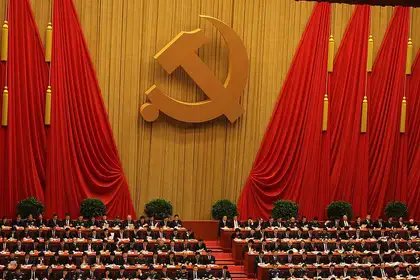
Chinese Communist Party Congress in session (Wikimedia).
As a new era of politics unfolds here, Asia politics expert Dr Marc Lanteigne has been observing China’s 19th Party Congress for policy directions and a new generation of leaders anointed this week.
The Chinese Communist Party (CCP) Congress, held every five years and involving over 2000 delegates, wrapped up on Wednesday. It announced who the seven members of its’ Politburo Standing Committee – China’s top leaders until 2022 – will be.
The new government has promised to expand trade and develop the Belt and Road economic initiatives, of which New Zealand is a partner, says Dr Lanteigne, a lecturer in Massey University’s Centre for Defence and Security Studies.
“Beijing is seeking to further promote globalisation and 'win-win' cooperation with the global community, including Oceania,” he says.
The Belt and Road Initiative is an ambitious development project for Beijing, developing infrastructure linking China to other parts of Asia and beyond, to build trade and economic links by land and sea.
President Xi Jinping and Premier Li Keqiang have retained their positions, but are now joined by a new generation of Chinese leaders: Li Zhanshu, Wang Yang, Wang Huning, Zhao Leji and Han Zheng.
Li Zhanshu will likely be appointed as the head of the Chinese parliament, the National People’s Congress, while Mr Zhao will probably be appointed as the new anti-corruption head within the Party, says Dr Lanteigne. However, there was no indication that President Xi has chosen a successor, he adds.
In addition to the new appointments, new terminology – ‘Xi Jinping Thought on Socialism with Chinese Characteristics for a New Era’ (习近平新时代中国特色社会主义思想) – will be added to the Chinese constitution, an indication of President Xi's growing political strength, Dr Lanteigne says.
He noted President Xi's speech delivered at the start of the gathering called for a “new era” in the country, along with changes to China's domestic and foreign policy.
“There has also been much talk about a new type of international relations being developed which reflects China as a great power,” says Dr Lanteigne, who is conversant in Chinese and has spent time teaching and researching in China.
President Xi was this week dubbed by TIME magazine as China’s most powerful leader since Mao Zedong, who founded the People’s Republic of China in 1949.
“On the foreign policy front, among the recommendations revealed so far include upholding the One China policy, maintaining Party supervision over the military, promoting the Belt and Road initiative, and building a global community and eschewing economic protectionism,” Dr Lanteigne says.
The president has also called for the eradication of poverty by 2021 and fully developed status by 2049, which will be the country's hundredth anniversary of its revolution when the Chinese Communist Party took power.
“He is also suggesting that China's experiences with economic development could be a model for other parts of the world, and that the country had now become a great power in the world – an interesting departure from previous Chinese governments which had avoided trumpeting the country's rising status.”
President Xi reiterated his 'four comprehensives' policy, (build a moderately prosperous society; deepen reform, govern the nation according to law, and strictly govern the Party).
“The president also may have taken a backhanded swing at the United States by saying that China would not engage in protectionism or closing of markets,” he says.